新视野大学英语第三版读写教程3课后翻译第五单元Unit 5
- 格式:ppt
- 大小:77.00 KB
- 文档页数:5
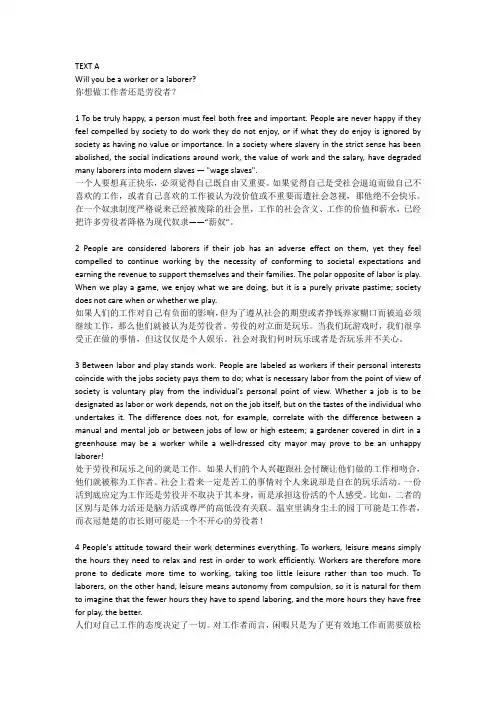
TEXT AWill you be a worker or a laborer?你想做工作者还是劳役者?1 To be truly happy, a person must feel both free and important. People are never happy if they feel compelled by society to do work they do not enjoy, or if what they do enjoy is ignored by society as having no value or importance. In a society where slavery in the strict sense has been abolished, the social indications around work, the value of work and the salary, have degraded many laborers into modern slaves — "wage slaves".一个人要想真正快乐,必须觉得自己既自由又重要。
如果觉得自己是受社会逼迫而做自己不喜欢的工作,或者自己喜欢的工作被认为没价值或不重要而遭社会忽视,那他绝不会快乐。
在一个奴隶制度严格说来已经被废除的社会里,工作的社会含义、工作的价值和薪水,已经把许多劳役者降格为现代奴隶——“薪奴”。
2 People are considered laborers if their job has an adverse effect on them, yet they feel compelled to continue working by the necessity of conforming to societal expectations and earning the revenue to support themselves and their families. The polar opposite of labor is play. When we play a game, we enjoy what we are doing, but it is a purely private pastime; society does not care when or whether we play.如果人们的工作对自己有负面的影响,但为了遵从社会的期望或者挣钱养家糊口而被迫必须继续工作,那么他们就被认为是劳役者。
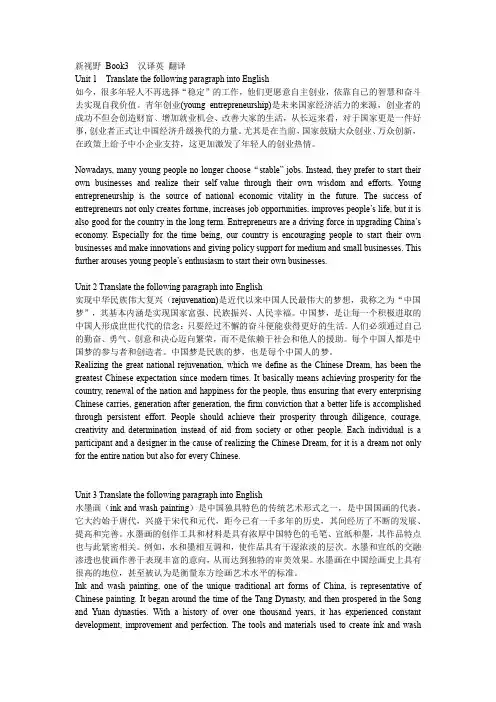
新视野Book3 汉译英翻译Unit 1 Translate the following paragraph into English如今,很多年轻人不再选择“稳定”的工作,他们更愿意自主创业,依靠自己的智慧和奋斗去实现自我价值。
青年创业(young entrepreneurship)是未来国家经济活力的来源,创业者的成功不但会创造财富、增加就业机会、改善大家的生活,从长远来看,对于国家更是一件好事,创业者正式让中国经济升级换代的力量。
尤其是在当前,国家鼓励大众创业、万众创新,在政策上给予中小企业支持,这更加激发了年轻人的创业热情。
Nowadays, many young people no longer choose“stable” jobs. Instead, they prefer to start their own businesses and realize their self-value through their own wisdom and efforts. Young entrepreneurship is the source of national economic vitality in the future. The success of entrepreneurs not only creates fortune, increases job opportunities, improves people’s life, but it is also good for the country in the long term. Entrepreneurs are a driving force in upgrading China’s economy. Especially for the time being, our country is encouraging people to start their own businesses and make innovations and giving policy support for medium and small businesses. This further arouses young people’s enthusiasm to start their own businesses.Unit 2 Translate the following paragraph into English实现中华民族伟大复兴(rejuvenation)是近代以来中国人民最伟大的梦想,我称之为“中国梦”,其基本内涵是实现国家富强、民族振兴、人民幸福。
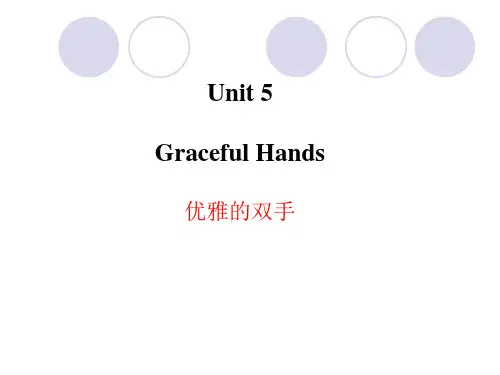
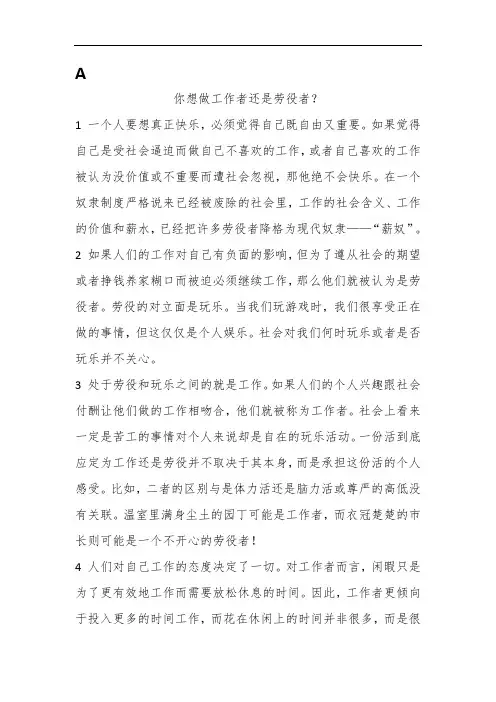
A你想做工作者还是劳役者?1 一个人要想真正快乐,必须觉得自己既自由又重要。
如果觉得自己是受社会逼迫而做自己不喜欢的工作,或者自己喜欢的工作被认为没价值或不重要而遭社会忽视,那他绝不会快乐。
在一个奴隶制度严格说来已经被废除的社会里,工作的社会含义、工作的价值和薪水,已经把许多劳役者降格为现代奴隶——“薪奴”。
2 如果人们的工作对自己有负面的影响,但为了遵从社会的期望或者挣钱养家糊口而被迫必须继续工作,那么他们就被认为是劳役者。
劳役的对立面是玩乐。
当我们玩游戏时,我们很享受正在做的事情,但这仅仅是个人娱乐。
社会对我们何时玩乐或者是否玩乐并不关心。
3 处于劳役和玩乐之间的就是工作。
如果人们的个人兴趣跟社会付酬让他们做的工作相吻合,他们就被称为工作者。
社会上看来一定是苦工的事情对个人来说却是自在的玩乐活动。
一份活到底应定为工作还是劳役并不取决于其本身,而是承担这份活的个人感受。
比如,二者的区别与是体力活还是脑力活或尊严的高低没有关联。
温室里满身尘土的园丁可能是工作者,而衣冠楚楚的市长则可能是一个不开心的劳役者!4 人们对自己工作的态度决定了一切。
对工作者而言,闲暇只是为了更有效地工作而需要放松休息的时间。
因此,工作者更倾向于投入更多的时间工作,而花在休闲上的时间并非很多,而是很少。
而对劳役者而言,休闲意味着从被迫状态中得到自主。
因此,他们自然会想,花在劳作上的时间越少,自在玩乐的时间越多,则越好。
5 除了花在闲暇上的时间不同,工作者和劳役者的区别还在于他们从工作中获得的个人满足感不同。
工作者喜欢自己的工作,感觉更快乐,更轻松,通常对自己的生活更满意。
他们工作起来也会更勤奋,更精细,因为他们对自己的工作已经产生了一种自豪感。
相反,由于劳役者的唯一动力是挣生活费,他们觉得每天花在苦差上的时间是一种浪费,不会让自己快乐。
他们不把每天的24小时都当作愉快有用的时光,认为只有花在休闲娱乐上的时间才是有意义的。
不幸的是,劳役者太常见了,只有一小部分人能有幸成为工作者。
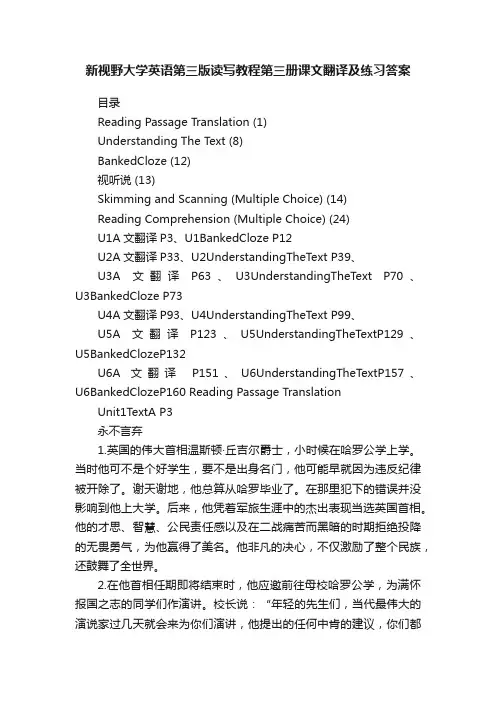
新视野大学英语第三版读写教程第三册课文翻译及练习答案目录Reading Passage Translation (1)Understanding The Text (8)BankedCloze (12)视听说 (13)Skimming and Scanning (Multiple Choice) (14)Reading Comprehension (Multiple Choice) (24)U1A文翻译P3、U1BankedCloze P12U2A文翻译P33、U2UnderstandingTheText P39、U3A文翻译P63、U3UnderstandingTheText P70、U3BankedCloze P73U4A文翻译P93、U4UnderstandingTheText P99、U5A文翻译P123、U5UnderstandingTheTextP129、U5BankedClozeP132U6A 文翻译P151、U6UnderstandingTheTextP157、U6BankedClozeP160 Reading Passage TranslationUnit1TextA P3永不言弃1.英国的伟大首相温斯顿·丘吉尔爵士,小时候在哈罗公学上学。
当时他可不是个好学生,要不是出身名门,他可能早就因为违反纪律被开除了。
谢天谢地,他总算从哈罗毕业了。
在那里犯下的错误并没影响到他上大学。
后来,他凭着军旅生涯中的杰出表现当选英国首相。
他的才思、智慧、公民责任感以及在二战痛苦而黑暗的时期拒绝投降的无畏勇气,为他赢得了美名。
他非凡的决心,不仅激励了整个民族,还鼓舞了全世界。
2.在他首相任期即将结束时,他应邀前往母校哈罗公学,为满怀报国之志的同学们作演讲。
校长说:“年轻的先生们,当代最伟大的演说家过几天就会来为你们演讲,他提出的任何中肯的建议,你们都要听从。
”那个激动人心的日子终于到了。
温斯顿爵士站了起来——他只有5英尺5英寸高,体重却有107 公斤。
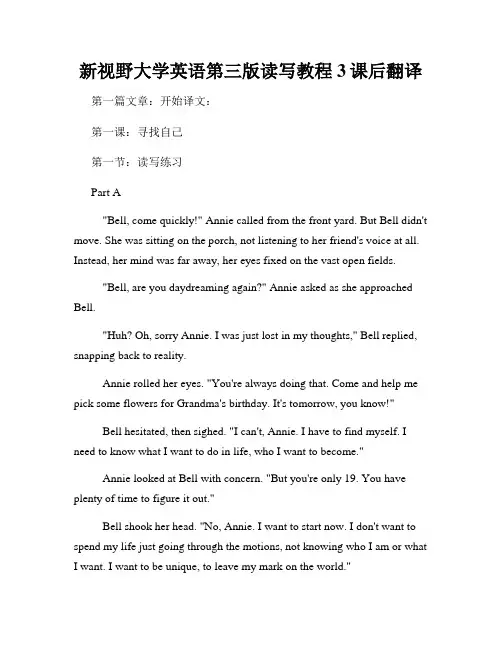
新视野大学英语第三版读写教程3课后翻译第一篇文章:开始译文:第一课:寻找自己第一节:读写练习Part A"Bell, come quickly!" Annie called from the front yard. But Bell didn't move. She was sitting on the porch, not listening to her friend's voice at all. Instead, her mind was far away, her eyes fixed on the vast open fields."Bell, are you daydreaming again?" Annie asked as she approached Bell."Huh? Oh, sorry Annie. I was just lost in my thoughts," Bell replied, snapping back to reality.Annie rolled her eyes. "You're always doing that. Come and help me pick some flowers for Grandma's birthday. It's tomorrow, you know!"Bell hesitated, then sighed. "I can't, Annie. I have to find myself. I need to know what I want to do in life, who I want to become."Annie looked at Bell with concern. "But you're only 19. You have plenty of time to figure it out."Bell shook her head. "No, Annie. I want to start now. I don't want to spend my life just going through the motions, not knowing who I am or what I want. I want to be unique, to leave my mark on the world."Part BBell spent the next few days exploring different hobbies and interests. She tried painting, writing, and even took up gardening. But nothing seemed to click. She felt lost and frustrated, not knowing where she belonged or what her true passion was.One day, while wandering aimlessly through the library, Bell came across a book on photography. Intrigued, she flipped through the pages, admiring the captivating images and powerful storytelling.It was as if a light bulb had suddenly switched on in Bell's mind. She knew deep down that photography was her calling. It allowed her to capture moments, emotions, and stories in a way that words alone could never convey.With renewed determination, Bell bought her first camera and started honing her skills. She spent hours exploring her surroundings, photographing landscapes, people, and everything in between.As she immersed herself in the world of photography, Bell's confidence grew. She started showcasing her work in local art galleries and soon gained recognition for her unique perspective and ability to capture raw emotions.Bell's journey to find herself had taken her through ups and downs, but in the end, she had discovered her true passion. Through the lens of her camera, she found not only herself but also a way to leave her mark on the world.Part CLooking back on her journey, Bell realized that finding oneself isn't about trying every hobby or pursuing every interest. It's about embracing the process and being open to new experiences.Bell's advice to anyone struggling to find themselves is simple: "Don't be afraid to explore. Try new things and follow your curiosity. Sometimes, the unexpected path leads to the most incredible discoveries."So, if you ever find yourself feeling lost or unsure of who you are, remember Bell's story. Embrace the journey of self-discovery, for it is through exploring the unknown that we truly find ourselves.结束译文。

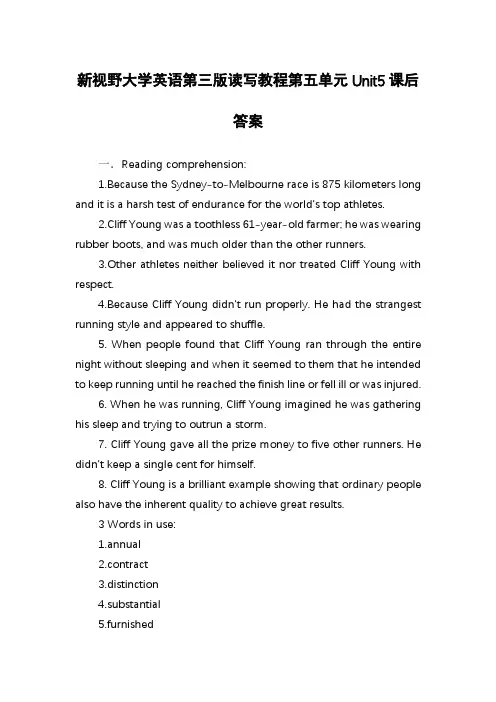
新视野大学英语第三版读写教程第五单元Unit5课后答案一.Reading comprehension:1.Because the Sydney-to-Melbourne race is 875 kilometers long and it is a harsh test of endurance for the world’s top athletes.2.Cliff Young was a toothless 61-year-old farmer; he was wearing rubber boots, and was much older than the other runners.3.Other athletes neither believed it nor treated Cliff Young with respect.4.Because Cliff Young didn’t run properly. He had the strangest running style and appeared to shuffle.5. When people found that Cliff Young ran through the entire night without sleeping and when it seemed to them that he intended to keep running until he reached the finish line or fell ill or was injured.6. When he was running, Cliff Young imagined he was gathering his sleep and trying to outrun a storm.7. Cliff Young gave all the prize money to five other runners. He didn’t keep a single cent for himself.8. Cliff Young is a brilliant example showing that ordinary people also have the inherent quality to achieve great results.3 Words in use:1.annual2.contract3.distinction4.substantial5.furnished6. amateur7. assemble8. react9. Apparent10. magnificent4 Word building:bore fascinate amusingexplosion assumption evolution compensation contribute elementary revolutionary5 Word building:1.assumption2.fascinated3.explosion4.elementary5. Compensation6.evolution7. amusing8. bore9. contribute10. revolutionary6 Banked cloze:1 K2 D3 C4 B5 H6 O7 F8 M9 A 10 G7 Expressions in use:1 passed away2 left behind3 give away4 had no intention of5 Up to6 regardless of7 might (just) as well8 fall ill9 in attendance10 to this day10. Translation:有关古代奥林匹克运动会的最早文字记载可追溯至公元前776年。
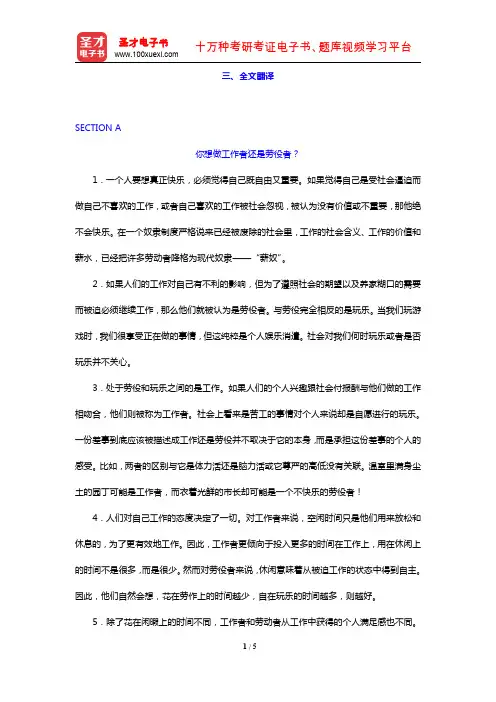
三、全文翻译SECTION A你想做工作者还是劳役者?1.一个人要想真正快乐,必须觉得自己既自由又重要。
如果觉得自己是受社会逼迫而做自己不喜欢的工作,或者自己喜欢的工作被社会忽视,被认为没有价值或不重要,那他绝不会快乐。
在一个奴隶制度严格说来已经被废除的社会里,工作的社会含义、工作的价值和薪水,已经把许多劳动者降格为现代奴隶——“薪奴”。
2.如果人们的工作对自己有不利的影响,但为了遵照社会的期望以及养家糊口的需要而被迫必须继续工作,那么他们就被认为是劳役者。
与劳役完全相反的是玩乐。
当我们玩游戏时,我们很享受正在做的事情,但这纯粹是个人娱乐消遣。
社会对我们何时玩乐或者是否玩乐并不关心。
3.处于劳役和玩乐之间的是工作。
如果人们的个人兴趣跟社会付报酬与他们做的工作相吻合,他们则被称为工作者。
社会上看来是苦工的事情对个人来说却是自愿进行的玩乐。
一份差事到底应该被描述成工作还是劳役并不取决于它的本身,而是承担这份差事的个人的感受。
比如,两者的区别与它是体力活还是脑力活或它尊严的高低没有关联。
温室里满身尘土的园丁可能是工作者,而衣着光鲜的市长却可能是一个不快乐的劳役者!4.人们对自己工作的态度决定了一切。
对工作者来说,空闲时间只是他们用来放松和休息的,为了更有效地工作。
因此,工作者更倾向于投入更多的时间在工作上,用在休闲上的时间不是很多,而是很少。
然而对劳役者来说,休闲意味着从被迫工作的状态中得到自主。
因此,他们自然会想,花在劳作上的时间越少,自在玩乐的时间越多,则越好。
5.除了花在闲暇上的时间不同,工作者和劳动者从工作中获得的个人满足感也不同。
工作者喜欢自己的工作,感觉更快乐,更轻松,通常对自己的生活也更满意。
他们工作起来也会更勤奋、更精细,因为他们对自己的工作已经产生了一种自豪感。
相反,由于劳役者的唯一动力是赚生活费,他们觉得每天花在苦差事上的时间是一种浪费,不会给自己带来快乐。
他们认为只有花在消遣和玩乐上的时间才有意义,而不是把每天的24小时都当作愉快有用的时间。
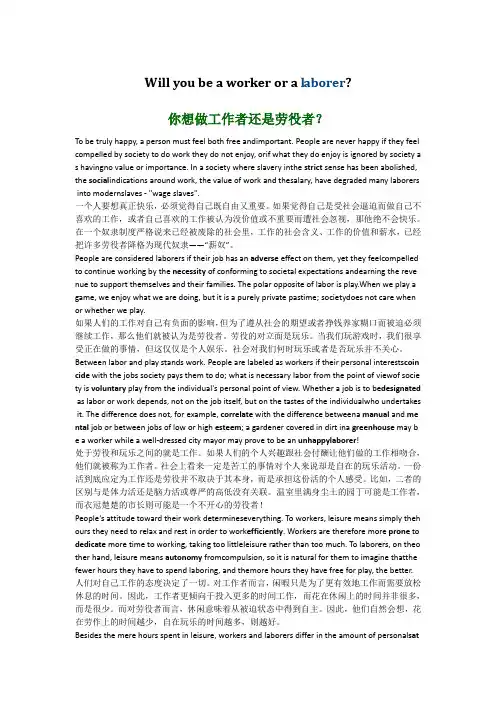
Will you be a worker or a laborer?你想做工作者还是劳役者?To be truly happy, a person must feel both free andimportant. People are never happy if they feel compelled by society to do work they do not enjoy, orif what they do enjoy is ignored by society a s havingno value or importance. In a society where slavery inthe strict sense has been abolished, the social indications around work, the value of work and thesalary, have degraded many laborers into modernslaves - "wage slaves".一个人要想真正快乐,必须觉得自己既自由又重要。
如果觉得自己是受社会逼迫而做自己不喜欢的工作,或者自己喜欢的工作被认为没价值或不重要而遭社会忽视,那他绝不会快乐。
在一个奴隶制度严格说来已经被废除的社会里,工作的社会含义、工作的价值和薪水,已经把许多劳役者降格为现代奴隶——“薪奴”。
People are considered laborers if their job has an adverse effect on them, yet they feelcompelled to continue working by the necessity of conforming to societal expectations andearning the reve nue to support themselves and their families. The polar opposite of labor is play.When we play a game, we enjoy what we are doing, but it is a purely private pastime; societydoes not care when or whether we play.如果人们的工作对自己有负面的影响,但为了遵从社会的期望或者挣钱养家糊口而被迫必须继续工作,那么他们就被认为是劳役者。

Will you be a worker or a laborer?你想做工作者还是劳役者?To be truly happy, a person must feel both free andimportant. People are never happy if they feel compelled by society to do work they do not enjoy, orif what they do enjoy is ignored by society a s havingno value or importance. In a society where slavery inthe strict sense has been abolished, the social indications around work, the value of work and thesalary, have degraded many laborers into modernslaves - "wage slaves".一个人要想真正快乐,必须觉得自己既自由又重要。
如果觉得自己是受社会逼迫而做自己不喜欢的工作,或者自己喜欢的工作被认为没价值或不重要而遭社会忽视,那他绝不会快乐。
在一个奴隶制度严格说来已经被废除的社会里,工作的社会含义、工作的价值和薪水,已经把许多劳役者降格为现代奴隶——“薪奴”。
People are considered laborers if their job has an adverse effect on them, yet they feelcompelled to continue working by the necessity of conforming to societal expectations andearning the reve nue to support themselves and their families. The polar opposite of labor is play.When we play a game, we enjoy what we are doing, but it is a purely private pastime; societydoes not care when or whether we play.如果人们的工作对自己有负面的影响,但为了遵从社会的期望或者挣钱养家糊口而被迫必须继续工作,那么他们就被认为是劳役者。
Unit 1 永不放弃英国的伟大首相温斯顿丘吉尔爵士,小时候在哈罗公学上学。
当时他可不是个好学生,要不是出身名门,他可能早就因为违反纪律被开除了。
谢天谢地,他总算从哈罗毕业了,在那里犯下的错误并没有影响到他上大学。
后来,他凭着军旅生涯中的杰出变现当选为英国首相。
他的才思、智慧、公民责任感以及在二战痛苦而黑暗的时期拒绝投降的无畏勇气,为他赢得了美名。
他非凡的决心,不仅激励了整个民族,还鼓舞了全世界。
在他首相任期即将结束时,他应邀前往母校哈罗公学,为满怀报国之志的同学们做演讲。
校长说;校长说:“年轻的先生们,当代最伟大的演说家过几天就会你们演讲,他提出的任何中肯的建议,你们都要听从。
”那个激动人心的日子终于到了。
温斯顿伯爵站了起来——他只有5 5英寸高,体重却有107公斤。
他做了言简意赅的讲话,永不放弃,永不,永不,永不,永不!“个人经历、教育机会、个人困境,这些都不能阻挡一个全力以赴追求成功的、有着坚强意志的人。
任务再苦,准备再长,难度再大,都不能让他放弃自己的追求。
就以本时代最有学问的两位科学家——阿尔伯特·爱因斯坦和托马斯·.爱迪生为例,他们都曾面临巨大的障碍和极端的批评,都曾被说成“不开窍”,被老师当成笨蛋,而放弃。
托马斯爱迪生还曾逃学,老师因为嫌他问的问题太多而经常鞭打他。
爱因斯坦一直到将近9岁才能流利的说话,学习成绩太差,有些人认为他都已经学不好了。
然而,这两个男孩的父母都相信他们,他们坚持不懈的每天和儿子一起努力,孩子们也了解到,要想成功就绝不要怕付出长期而艰辛的努力。
最终,爱因斯坦和爱迪生都摆脱了童年的困扰,进而做出了造福当今全世界的伟大发现。
再如亚伯拉罕·林肯这个英雄的典范,他一生面临了无数艰辛,失败和接二连三的不幸。
他的出身和经历真是一点也算不上光鲜,他在一个非常贫困的家庭长大,只受过一年正规教育,轻伤两度失败初恋爱人的突然离世也使他精神崩溃,还在八次政治选举中落马。
Unit 5Section ALanguage focusWord building 四Words learned New words formed-ismReal RealismImperial ImperialismCommercial CommercialismHuman HumanismTerror Terrorism-mentRecruit RecruitmentResent ResentmentEnroll EnrollmentRefresh RefreshmentShip ShipmentBanked cloze 六1O 2F 3L 4C 5K 6H 7I 8N 9E 10MExpression in use 七1correlate with 2refrain with 3count down 4slaving away 5coincided with6contended with 7be designated as 8conformed toTranslation英式下午茶的仪式可以追溯到19世纪40 年代,该传统是由之前英国的茶饮仪式和习惯发展而来的。
茶最初在17 世纪50 年代晚期被引入英国,但由于价格昂贵,所以很长一段时间里,只有皇家和贵族才能享用。
直到将近200 多年之后,英国人才养成吃下午茶的习惯。
在当时,英国人一日两餐:快接近中午时分的丰盛早餐和晚上八点左右的晚餐。
据说第七代贝德福德公爵夫人安娜开创了下午茶的传统,以此来缓解晚餐前的饥饿感。
她邀请朋友和她一起在下午四五点钟吃下午茶。
下午茶中包括茶和一些点心,比如精致的蛋糕及三明治。
这些小巧的美食用精美的瓷器盛装。
下午茶很快就流行开来,现在已经成为优雅英国生活方式的一个象征。
正如小说家亨利詹姆斯写道的那样:“人生鲜有比全心全意享用下午茶这一仪式更惬意的时刻了。
”Understanding the text 二1C 2B 3D 4A 5B 6D 7B 8ALanguage focusWord in use 四1Rush2specialty3ponder4utilize5pierce6bias7ensue8impart9infectious10hospitality Expression in use 五1out 2on 3away 4to 5to 6in 7away 8up2 Charlene, a 16-year-old student at a high school, found herself faced with a mathtest to whose questions she knew none of the answers.CollocationWarm-up1prideful 2high 3special 4trivial 5sole 6friendly 7cheerful 8instant 9charitable 八课文翻译Text A你想做工作者还是劳役者?1 一个人要想真正快乐,必须觉得自己既自由又重要。
目录Reading Passage Translation (1)Understanding The Text (8)BankedCloze (12)视听说 (13)Skimming and Scanning (Multiple Choice) (14)Reading Comprehension (Multiple Choice) (24)U1A文翻译P3、U1BankedCloze P12U2A文翻译P33、U2UnderstandingTheText P39、U3A文翻译P63、U3UnderstandingTheText P70、U3BankedCloze P73U4A文翻译P93、U4UnderstandingTheText P99、U5A文翻译P123、U5UnderstandingTheTextP129、U5BankedClozeP132U6A 文翻译 P151、U6UnderstandingTheTextP157、U6BankedClozeP160 Reading Passage TranslationUnit1TextA P3永不言弃1.英国的伟大首相温斯顿·丘吉尔爵士,小时候在哈罗公学上学。
当时他可不是个好学生,要不是出身名门,他可能早就因为违反纪律被开除了。
谢天谢地,他总算从哈罗毕业了。
在那里犯下的错误并没影响到他上大学。
后来,他凭着军旅生涯中的杰出表现当选英国首相。
他的才思、智慧、公民责任感以及在二战痛苦而黑暗的时期拒绝投降的无畏勇气,为他赢得了美名。
他非凡的决心,不仅激励了整个民族,还鼓舞了全世界。
2.在他首相任期即将结束时,他应邀前往母校哈罗公学,为满怀报国之志的同学们作演讲。
校长说:“年轻的先生们,当代最伟大的演说家过几天就会来为你们演讲,他提出的任何中肯的建议,你们都要听从。
”那个激动人心的日子终于到了。
温斯顿爵士站了起来——他只有5英尺5英寸高,体重却有107 公斤。
新视野大学英语第三版读写教程第五单元Unit5课后答案一.Reading comprehension:1.Because the Sydney-to-Melbourne race is 875 kilometers long and it is a harsh test of endurance for the world’s top athletes.2.Cliff Young was a toothless 61-year-old farmer; he was wearing rubber boots, and was much older than the other runners.3.Other athletes neither believed it nor treated Cliff Young with respect.4.Because Cliff Young didn’t run properly. He had the strangest running style and appeared to shuffle.5. When people found that Cliff Young ran through the entire night without sleeping and when it seemed to them that he intended to keep running until he reached the finish line or fell ill or was injured.6. When he was running, Cliff Young imagined he was gathering his sleep and trying to outrun a storm.7. Cliff Young gave all the prize money to five other runners. He didn’t keep a single cent for himself.8. Cliff Young is a brilliant example showing that ordinary people also have the inherent quality to achieve great results.3 Words in use:1.annual2.contract3.distinction4.substantial5.furnished6. amateur7. assemble8. react9. Apparent10. magnificent4 Word building:bore fascinate amusingexplosion assumption evolution compensation contribute elementary revolutionary5 Word building:1.assumption2.fascinated3.explosion4.elementary5. Compensation6.evolution7. amusing8. bore9. contribute10. revolutionary6 Banked cloze:1 K2 D3 C4 B5 H6 O7 F8 M9 A 10 G7 Expressions in use:1 passed away2 left behind3 give away4 had no intention of5 Up to6 regardless of7 might (just) as well8 fall ill9 in attendance10 to this day10. Translation:有关古代奥林匹克运动会的最早文字记载可追溯至公元前776年。
NNCE Book3课后翻译参考答案Unit1汉译英原文:如今,很多年轻人不再选择" 稳定" 的工作,他们更愿意自主创业,依靠自己的智慧和奋斗去实现自我价值。
青年创业(young entrepreneurship)是未来国家经济活力的来源,创业者的成功不但会创造财富、增加就业机会、改善大家的生活,从长远来看,对于国家更是一件好事,创业者正是让中国经济升级换代的力量。
尤其是在当前,国家鼓励大众创业、万众创新,在政策上给予中小企业支持,这更加激发了年轻人的创业热情。
Keys:Nowadays, many young people no longer choose "stable" jobs.they prefer to start their own businesses and realize their self-value through their own wisdom and efforts. Young entrepreneurship is the source of national economic vitality in the future. The success of entrepreneurs not only creates fortune, increases job opportunities, improves people's life, but it is also good for the country in the long term. Entrepreneurs are a driving force in upgrading China's economy. Especially for the time being, our country is encouraging people to start their own businesses and make innovations and giving policy support for medium and small businesses. This further arouses young people's enthusiasm to start their own businesses.Unit 2汉译英原文:实现中华民族伟大复兴(rejuvenation )是近代以来中国人民最伟大的梦想,我们称之为“中国梦”,其基本内涵是实现国家富强、民族振兴、人民幸福。
新视野大学英语(第三版)读写教程第三册课后翻译答案新视野Book3 汉译英翻译Unit 1 Translate the following paragraph into English如今,很多年轻人不再选择“稳定”的工作,他们更愿意自主创业,依靠自己的智慧和奋斗去实现自我价值。
青年创业(young entrepreneurship)是未来国家经济活力的来源,创业者的成功不但会创造财富、增加就业机会、改善大家的生活,从长远来看,对于国家更是一件好事,创业者正式让中国经济升级换代的力量。
尤其是在当前,国家鼓励大众创业、万众创新,在政策上给予中小企业支持,这更加激发了年轻人的创业热情。
Nowadays, many young people no longer choose“stable” jobs. Instead, they prefer to start their own businesses and realize their self-value through their own wisdom and efforts. Young entrepreneurship is the source of national economic vitality in the future. The success of entrepreneurs not only creates fortune, increases job opportunities, improves people’s life, but it is also good for the country in the long term. Entrepreneurs are a driving force in upgrading China’s economy. Especially for the time being, our country is encouraging people to start their own businesses and make innovations and giving policy support for medium and small businesses. This furtherarouses young people’s enthusiasm to sta rt their own businesses.Unit 2 Translate the following paragraph into English实现中华民族伟大复兴(rejuvenation)是近代以来中国人民最伟大的梦想,我称之为“中国梦”,其基本内涵是实现国家富强、民族振兴、人民幸福。